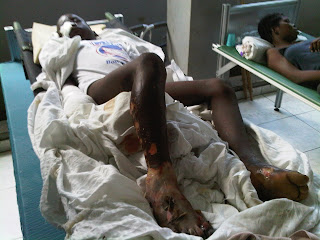
SoupNazzi
Shared on Wed, 01/20/2010 - 14:47



Former Special Forces Medics, Marines, Soldiers, as well as Firemen and Doctors formed a team to respond to Haiti to provide medical supplies as well as triage for the wounded. They formed Team Rubicon. They've been on the ground there for three days already and have already treated hundreds:
Just want to reemphasize that we move light and fast...it's why we ignored the Red Cross and self deployed and why we are first responders to six day old wounds.
- Assistant Team Leader William McNulty
These guys are awesome. One of their doctors even took over as lead physician at the Outdoor General Hospital, as there were no ER specific Docs present to staff it.
We located one of the hardest hit sites in Port au Prince, known by the local lay and medical community to clearly be in urgent need of medical help. The site was located approximately 30 minutes by truck from our compound.
We followed a typical sinuous path to the once park-turned-community open shelter. Along the way we witnessed the expected collapsed buildings, with several owners standing in front of them actively engaging their cell phones, the wafts of the decomposing bodies, and the to and fro of traffic, some rescue and security in nature, most of it local.
Camp was set up quickly, making use of a plastic folding table and a wooden picnic table, both being placed under the shade, with chairs set about them to expedite patient evaluation. A separate site was set up for medications, organized by class, and for supplies, such as gauze and alcohol.
Our Jesuit brother and the interpreter, taking advantage of the novelty of our arrival, were easily able to capture the attention of the locals, asking to “please bring us those in your community who most need medical attention.”
Within a matter of minutes we were presented with a wide assortment of severe illnesses, all of them traumatic and now nearly 6 days old.
The first patient was a 78 year old woman who had gotten her hand crushed, by a fallen concrete slab in her kitchen. She was preparing dinner for her children and grandchildren. She was calm and patient, as we slowly removed the gauze that had not been changed for 5 days. The dried blood and puss had fused the dressing in a patchy assortment of wet and dry areas, with bubbles percolating up from the wet areas, indicating anaerobic bacterial (bacteria the cause gangrene) infection. One is able to diagnose this type of infection with the nose: it has a distinctive and unforgettable odor.
As we methodically unwrapped and gently cut away the bandage, we had time to get to know her and also to prepare her for the probability that she would likely lose the entire hand, adding to the loss of her five fingers.
We saw several other patients requiring amputations this first day. The other major set of injuries were broken bones, fractures, many of the arms, legs, and ankles. The team was able to make dozens and dozens of improvised splints.
Our efforts were focussed on triaging (separating the patients by the severity of the trauma or illness) and either providing definitive treatment or referring to the appropriate medical facility.
By the early afternoon, we had a working knowledge of the appropriate referral sources, including a local hospital that was performing surgeries and a local doctor, Carlo, a very pleasant and bright doctor who has done his best in the days prior to our arrival. Like most of Porte au Prince, he had simply been overwhelmed.
Perhaps the most acute or urgent case was a man in his mid twenties who had a ceiling fall on him. He was pulled out of his house 3 days after the earthquake.
This fit and muscular man had what we term an acute abdomen. This essentially means that there is a very bad process occurring in the abdomen that required surgery. Without surgery most patients die, usually within hours to days.
Based on how he presented to us, his anguished screams of pain, his now more rapid and shallow breathing, it was clear that he would likely not make it through the night, with what we suspected was continuous bleed from his ruptured spleen.
By the end of the day we had secured 4 pickups or trucks by simply asking the local driving up and down the mountainside for help. The cooperation between our team and the impromptu community team was almost seamless and crucial in evacuating to the Lysee Frances (a local hospital with surgeons) 4 individuals for amputations, two pelvic fractures, one femur fracture, and the gentleman with the acute abdomen.
We were challenged, left exhausted, and utterly moved by the support, humanity, and civility of the local Haitians.
It is a privilege to be here.
Eduardo P. Dolhun, M.D.
www.dolhunclinic.com
Some really good blog entries as well as pictures.
Make a donation if you can.
- SoupNazzi's blog
- Log in or register to post comments


Comments